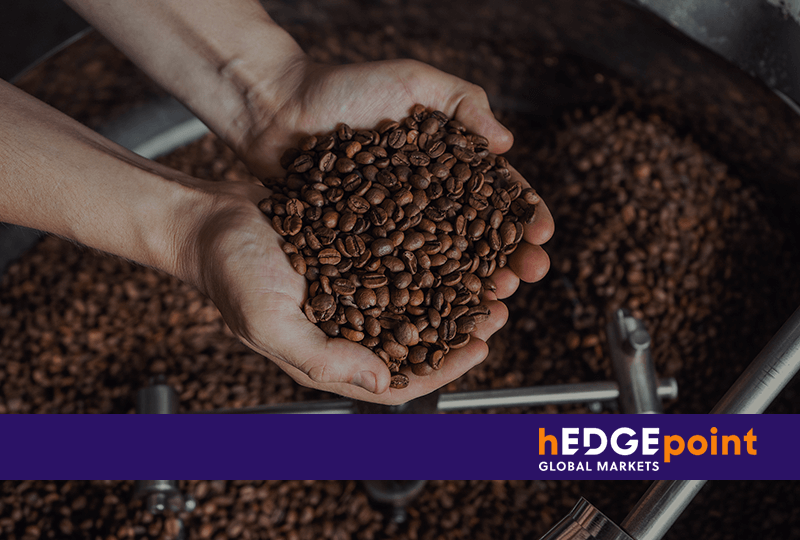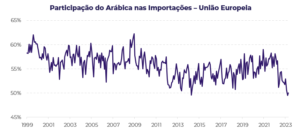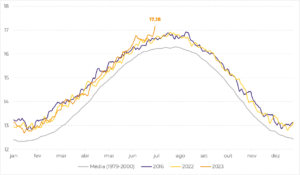
Understanding coffee consumption trends is vital for everyone involved in this commodity’s global chain. After all, this market has enormous relevance for

Understanding coffee consumption trends is vital for everyone involved in this commodity’s global chain. After all, this market has enormous relevance for the economies of many countries, and the commodity itself is indispensable in the daily lives of innumerable people.
According to International Coffee Organization (ICO) data, the estimated world production for the 2022/23 crop was 171.3 million bags, a number that represents an increase of 1.7% compared to the previous cycle.
The global coffee consumption forecast for the current harvest in progress is that demand should reach around 178.5 million (60-kg.) bags. This quantity also represents an increase of 1.7% related to the same period the previous year.
In view of this scenario, it’s essential that we monitor changes in coffee consumption in order to manage the risks that may affect the entire coffee market. With this in mind, we invited Natália Gandolphi, Market Intelligence Analyst at hEDGEpoint, to discuss the main consumer trends and their impacts.
Continue reading to learn more on the subject!
Our planet has four major coffee types: Arabica, Robusta, Liberica, and Excelsa. Among them, only two dominate world trade: Arabica and Canephora beans (also called Conilon or Robusta). The main difference between these two varieties is the number of chromosomes belonging to each species.
While conilon has 22 pairs of chromosomes that contain the plant’s genetic material, arabica has twice as many. In practice, this means there are different ways of growing and tasting diverse coffees. We’ll explain the other significant differences between them below:
As Natália Gandolfi explains, when we talk about coffee consumption, there may be a migration of preference from more expensive coffees to cheaper ones.

Natália Gandolphi, Market Intelligence Analyst
“This is happening in response to macroeconomic conditions, in a global context of high inflation and high interest rates, which reduce purchasing power,” she clarified.
One of the consequences of this scenario is that consumption tends to migrate from arabica coffee to canephora because it costs the consumer less. Just to give you an idea: the quantity of arabica coffee imports to the European Union (EU) is at its lowest level since 1999. According to Gandolfi, EU nations are hence seeking to increase imports of robusta coffee beans, mainly from countries in Asia and Africa, the major producers of this variety.
Arabica’s share of total imports – European Union (EU)

Source: Eurostat, hEDGEpoint Global Markets
For the 22/23 coffee cycle, a deficit is expected for both arabica and robusta coffee beans. As for the 23/24 cycle, arabica should present a surplus and put pressure on price arbitrage, with the tendency for demand to grow in countries like Brazil.
The world 22/23 coffee crop’s deficit was mainly due to the reduction in Brazilian production due to adverse weather conditions. From this scenario, we can observe other consumption trends such as:
Gandolphi points out that this migration is directly related to the scenarios before and after the COVID-19 pandemic.
“When we entered the pandemic, there were aid policies made available to families. At that time, savings were also high. Consumption didn’t feel the impact so much, and arabica coffee continued to have high sales numbers,” she explained.
However, as we reached the end of the pandemic, savings became depleted. Aid was also terminated, accompanying a deterioration in purchasing power and high inflation globally.
“We no longer have government aid, savings levels have been reduced, and inflation is persistent in nations like the U.S., the main importer of coffee in the world. Banks in several countries have raised interest rates to control the situation. The result? Direct impacts on consumers, who felt all these effects in their pockets,” Gandolphi added.
With the end consumer looking for cheaper coffee, producers will need to adapt production to meet this demand. Gandolfi stressed that coffee is a perennial crop—that is, the decision to plant today will be reflected in the supply over the next two to three years.
“The dynamics we see today won’t necessarily be reflected in the next cycle, but rather from the 24/25 harvest. In Brazil, for example, the world’s largest coffee producer, we’re seeing an increase in conilon coffee plantations, corresponding to the trend of increased consumption of this bean,” she remarked.
Another factor that could impact coffee production in the long term is associated with climate issues. Gandolphi points out that temperature increases interfere with the production of arabica coffee, which is less resistant to heat: “It needs more rain and milder temperatures, while conilon can withstand higher temperatures and longer periods of drought,” she stated.
When we look at the climate change issue, this is a long-term challenge that could affect the entire coffee cycle. If temperatures continue to rise, the cultivation of robusta coffee should grow even more, as it adapts better to these conditions.
Global Temperatures Hit New Records

Fonte: Instituto de Mudanças Climáticas, Universidade de Maine
With these new consumption trends, climate change, and global macroeconomic effects, the coffee market is constantly subject to price volatility. It’s critical to have a plan that can provide more security and protection to all those involved in this commodity chain.
The best option to manage risk is provided by hEDGEpoint. We have extensive knowledge of the coffee sector to better understand new dynamics and offer the most effective hedging products.
Talk to a hEDGEpoint specialist today to learn more about how we can help your business.

Rua Funchal, 418, 18º andar - Vila Olímpia São Paulo, SP, Brasil
Contato
(00) 99999-8888 example@mail.com
Section
Home
O que Fazemos
Mercado
Quem Somos
HUB
Blog
Esta página foi preparada pela Hedgepoint Schweiz AG e suas afiliadas (“Hedgepoint”) exclusivamente para fins informativos e instrutivos, sem o objetivo de estabelecer obrigações ou compromissos com terceiros, nem de promover uma oferta ou solicitação de oferta de venda ou compra de quaisquer valores mobiliários, commodity interests ou produtos de investimento.
A Hedgepoint e suas associadas renunciam expressamente a qualquer uso das informações contidas neste documento que direta ou indiretamente resulte em danos ou prejuízos de qualquer natureza. As informações são obtidas de fontes que acreditamos serem confiáveis, mas não garantimos a atualidade ou precisão dessas informações.
O trading de commodity interests, como futuros, opções e swaps, envolve um risco substancial de perda e pode não ser adequado para todos os investidores. Você deve considerar cuidadosamente se esse tipo de negociação é adequado para você, levando em conta sua situação financeira. O desempenho passado não é necessariamente indicativo de resultados futuros. Os clientes devem confiar em seu próprio julgamento independente e/ou consultores antes de realizar qualquer transação.
A Hedgepoint não fornece consultoria jurídica, tributária ou contábil, sendo de sua responsabilidade buscar essas orientações separadamente.
A Hedgepoint Schweiz AG está organizada, constituída e existente sob as leis da Suíça, é afiliada à ARIF, a Associação Romande des Intermédiaires Financiers, que é uma Organização de Autorregulação autorizada pela FINMA. A Hedgepoint Commodities LLC está organizada, constituída e existente sob as leis dos Estados Unidos, sendo autorizada e regulada pela Commodity Futures Trading Commission (CFTC) e é membro da National Futures Association (NFA), atuando como Introducing Broker e Commodity Trading Advisor. A Hedgepoint Global Markets Limited é regulada pela Dubai Financial Services Authority. O conteúdo é direcionado a Clientes Profissionais e não a Clientes de Varejo. A Hedgepoint Global Markets PTE. Ltd está organizada, constituída e existente sob as leis de Singapura, isenta de obter uma licença de serviços financeiros conforme o Segundo Anexo do Securities and Futures (Licensing and Conduct of Business) Act, pela Monetary Authority of Singapore (MAS). A Hedgepoint Global Markets DTVM Ltda. é autorizada e regulada no Brasil pelo Banco Central do Brasil (BCB) e pela Comissão de Valores Mobiliários (CVM). A Hedgepoint Serviços Ltda. está organizada, constituída e existente sob as leis do Brasil. A Hedgepoint Global Markets S.A. está organizada, constituída e existente sob as leis do Uruguai.
Em caso de dúvidas não resolvidas no primeiro contato com o atendimento ao cliente (client.services@hedgepointglobal.com), entre em contato com o canal de ouvidoria interna (ombudsman@hedgepointglobal.com – global ou ouvidoria@hedgepointglobal.com – apenas Brasil) ou ligue para 0800-8788408 (apenas Brasil).
Integridade, ética e transparência são valores que guiam nossa cultura. Para fortalecer ainda mais nossas práticas, a Hedgepoint possui um canal de denúncias para colaboradores e terceiros via e-mail ethicline@hedgepointglobal.com ou pelo formulário Ethic Line – Hedgepoint Global Markets.
Nota de segurança: Todos os contatos com clientes e parceiros são realizados exclusivamente por meio do nosso domínio @hedgepointglobal.com. Não aceite informações, boletos, extratos ou solicitações de outros domínios e preste atenção especial a variações em letras ou grafias, pois podem indicar uma situação fraudulenta.
“Hedgepoint” e o logotipo “Hedgepoint” são marcas de uso exclusivo da Hedgepoint e/ou de suas afiliadas. O uso ou reprodução é proibido, a menos que expressamente autorizado pela HedgePoint.
Além disso, o uso de outras marcas neste documento foi autorizado apenas para fins de identificação. Isso, portanto, não implica quaisquer direitos da HedgePoint sobre essas marcas ou implica endosso, associação ou aprovação pelos proprietários dessas marcas com a Hedgepoint ou suas afiliadas.
aA Hedgepoint Global Markets é correspondente cambial do Ebury Banco de Câmbio, de acordo com a resolução CMN Nº 4.935, DE 29 DE JULHO DE 2021, Artigo 14 do Banco Central do Brasil (BACEN).
Para mais informações sobre nosso parceiro, serviços disponíveis, atendimento e ouvidoria, acesse o link a seguir: https://br.ebury.com/